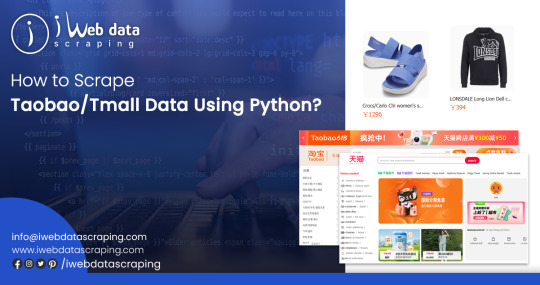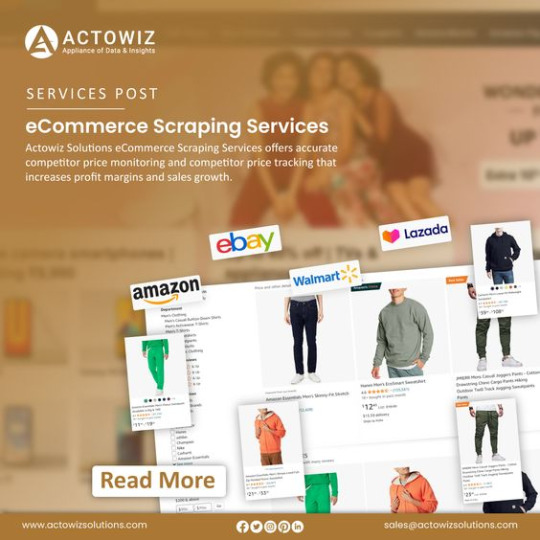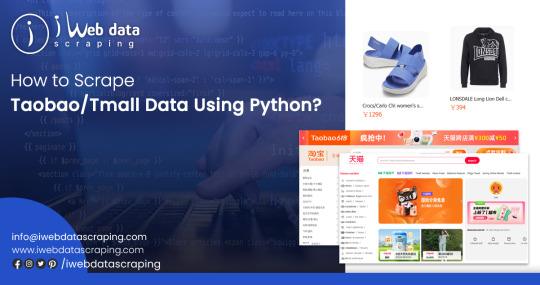#WebScrapingEcommerceWebsite
Explore tagged Tumblr posts
Text

Fnac Data Scraping helps businesses gain insights into retail trends, optimize pricing strategies, and enhance product listings for better customer engagement.our client gained a clear advantage with real-time monitoring of Fnac’s dynamic marketplace. This enabled them to sharpen their product positioning, adapt swiftly to market shifts, and fuel sustainable growth in the highly competitive French retail environment.
Read more >> https://www.retailscrape.com/fnac-data-scraping-retail-market-intelligence.php
officially published by https://www.retailscrape.com/.
#FnacDataScraping#FnacProductDataExtraction#ScrapeFnacWebsite#FnacEcommerceDataScraper#FnacElectronicsDataScraping#FnacPriceComparisonDataScraping#FnacDataScrapingForEcommerceIntelligence#PriceOptimizationService#PriceMonitoringService#DynamicPricingSolutions#WebScrapingEcommerceWebsite
0 notes
Text
Scrape Retailers Data | Web Scraping Ecommerce Website Data
Unlock valuable insights with our cutting-edge web scraping service - Scrape Retailers Data! Gain a competitive edge by scraping ecommerce website data from various retailers.
know more: https://www.actowizsolutions.com/scrape-popular-ecommerce-website-data.php
#ScrapeRetailersData#WebScrapingEcommerceWebsite#EcommerceWebsiteDataScraping#ScrapeEcommerceWebsiteData
0 notes
Text

#ScrapeTaobaoTmallDataUsingPython#Taobaoproductdatascrapingservices#TaobaoTmallProductDataScraper#ScrapingproductdatafromTaobao#WebScrapingEcommerceWebsites#Ecommerceproductdatascrapingservices#scrapeproductsfromTmall.com.
0 notes
Link
eCommerce Web Scraping Tools & Services | Retailgators
RetailGators offers eCommerce scraping tools, which help you to provide eCommerce web scraping services at best prices in the USA, UK, Australia, UAE, Germany.
0 notes
Text
Improving Online Retail Strategies With Real-Time Fnac Data Scraping
Introduction
This case study highlights how our Fnac Data Scraping solutions empowered retailers with deep market visibility, enabling more innovative pricing strategies and a more potent competitive edge. Through advanced technologies and tailored data delivery, we helped our client unlock actionable insights to make informed business decisions, optimize market presence, and increase profitability.
By integrating Fnac Product Data Extraction into their strategic operations, our client gained a clear advantage with real-time monitoring of Fnac’s dynamic marketplace. This enabled them to sharpen their product positioning, adapt swiftly to market shifts, and fuel sustainable growth in the highly competitive French retail environment.
The Client
A specialty electronics retailer with 80+ physical stores and a growing e-commerce footprint turned to us to tackle key pricing challenges. Despite a solid reputation, they lost market share due to ineffective pricing strategies. Implementing Fnac Data Scraping became crucial, as the lack of competitor pricing insights directly impacted their revenue goals and customer retention.
Due to Fnac's dynamic marketplace and vast product catalog, optimizing prices, especially during seasonal promotions, was complex. Manual efforts to Scrape the Fnac Website fell short in delivering timely and accurate data, leading to missed pricing opportunities and eroding customer loyalty.
The leadership realized that harnessing data intelligence was essential for staying competitive in the electronics market. Yet, limited visibility into Fnac’s expensive product landscape made evaluating their positioning across core categories difficult.
Key Challenges Faced by the Client
In their effort to sharpen competitive intelligence and strengthen market positioning, the client grappled with several critical hurdles:
Intelligence Gaps Uncovered
A lack of insight into Fnac's ecosystem led to incomplete competitor analysis, which, due to fragmented market data and inconsistent intelligence, hindered effective product positioning and pricing.
Slow Price Reaction
Relying on manual weekly tracking left the retailer lagging behind Fnac’s price shifts. Without Fnac Electronics Data Scraping, they couldn't adjust prices quickly in a dynamic environment.
Forecasting Blind Spots
Outdated forecasting tools couldn’t capture rapid market changes. The retailer required Price Monitoring Service capabilities for real-time tracking of Fnac’s pricing shifts and promotional tactics.
Manual Workflow Drain
Heavy reliance on manual analysis slowed decisions. They required an Fnac E-Commerce Data Scraper to autonomously detect pricing shifts and opportunities, improving overall operational efficiency.
Channel Sync Failure
Disconnected systems led to inconsistent pricing across channels. Adopting Web Scraping E-Commerce Website tools would help standardize pricing strategies like Fnac’s seamless cross-platform approach.
Key Solutions for Addressing Client Challenges
We implemented innovative approaches to resolve the client's challenges, leveraging advanced data extraction and analytics technologies:
Unified Insights Hub
We built a centralized platform using Fnac Product Data Extraction to collect real-time marketplace data, driving faster strategic decisions through competitor tracking and instant visibility into product dynamics.
Instant Price Alerts
By using a method to Scrape Fnac Website, we enabled near-instant detection of pricing updates, offering the client valuable lead time to optimize responses before consumer impact.
Smart Market Fusion
Leveraging the Fnac Price Comparison Data Scraping Service, we integrated seasonal, stock, and promo signals into dynamic pricing models, enabling clients to adapt swiftly to market conditions.
Auto-Pricing Engine
Using a robust Price Optimization Service, we delivered real-time recommendations by analyzing margins and market shifts, automating decisions to reduce manual involvement and improve price strategy execution.
Sync-to-Win Model
With Dynamic Pricing Solutions, we aligned Fnac’s promotional shifts to the client’s pricing strategies, automating responses to maintain competitiveness without compromising product profitability.
Mobile Price Control
A flexible platform powered by Fnac Data Scraping For E-Commerce Intelligence allowed remote pricing adjustments, replacing static updates with agile, always-on pricing optimization across devices.
Key Insights Gained from Fnac Data Scraping
Consumer Sensitivity Analysis Revealed products with high price elasticity on Fnac's platform, offering immediate margin optimization opportunities.
Market Position Mapping Highlighted the optimal timing for price adjustments in relation to Fnac’s own pricing cycles.
Channel Strategy Differentiation Provided insights into Fnac’s multi-channel pricing variations, enabling more effective and targeted promotional improvements.
Competitive Cycle Analysis Identified consistent patterns in Fnac’s pricing adjustments, supporting more strategic and predictive revenue management.
Evidence-Based Decision Framework Helped the client implement adaptive pricing models grounded in comprehensive marketplace data, enhancing decision-making accuracy.
Benefits of Fnac Data Scraping From Retail Scrape
Market Leadership
By leveraging Fnac Electronics Data Scraping, the client optimized market positioning, enhanced the perceived value proposition, and responded quickly to Fnac's competitive strategies for sustained growth.
Profit Stability
Utilizing the Fnac Price Comparison Data Scraping Service, the client forecasted market trends, improved pricing strategies, and maintained healthy profit margins despite market fluctuations and competition.
Efficiency Boost
The Fnac E-Commerce Data Scraper technology minimized manual research, enabling rapid, data-driven decisions to refine pricing strategies and stay ahead in competitive product categories.
Competitive Edge
Using Price Monitoring Service capabilities, the client gathered key insights into French retail trends, making proactive product and pricing adjustments to outpace competition and enhance profitability in the electronics market.

Retail Scrape's Fnac Data Scraping solutions have revolutionized our approach to the French electronics market. By gaining comprehensive access to Dynamic Pricing Solutions, we've swiftly adjusted our strategies, fine-tuned our product offerings, and boosted our profit margins by 28%, even in the face of increasing market competition.
- Chief Commercial Officer, European Electronics Retailer
Conclusion
Staying ahead in the competitive French retail market requires advanced intelligence. Fnac Data Scraping helps businesses monitor competitor pricing, make informed decisions, and boost competitiveness across various product categories.
Our Price Optimization Service seamlessly integrates pricing intelligence and insights, enhancing your strategic positioning on platforms like Fnac. Our experts will analyze market challenges, optimize pricing, and improve profit margins through Fnac Data Scraping For E-Commerce Intelligence.
Contact Retail Scrape to eliminate pricing inconsistencies, outpace competitors like Fnac, and drive growth with our advanced Web Scraping E-Commerce Website solutions.
Read more >> https://www.retailscrape.com/fnac-data-scraping-retail-market-intelligence.php
officially published by https://www.retailscrape.com/.
#FnacDataScraping#FnacProductDataExtraction#ScrapeFnacWebsite#FnacEcommerceDataScraper#FnacElectronicsDataScraping#FnacPriceComparisonDataScraping#FnacDataScrapingForEcommerceIntelligence#PriceOptimizationService#PriceMonitoringService#DynamicPricingSolutions#WebScrapingEcommerceWebsite
0 notes
Text
Scrape Retailers Data | Web Scraping Ecommerce Website Data
Unlock valuable insights with our cutting-edge web scraping service - Scrape Retailers Data! Gain a competitive edge by scraping ecommerce website data from various retailers.
know more: https://www.actowizsolutions.com/scrape-popular-ecommerce-website-data.php
#ScrapeRetailersData#WebScrapingEcommerceWebsite#EcommerceWebsiteDataScraping#ScrapeEcommerceWebsiteData
0 notes
Text
The Ultimate Guide to Scrape Lazada Product Data
'Using Actowiz Solutions Lazada Product data Scraping Services in the USA, UK, UAE, and Canada helps you Scrape Lazada Product Data like prices, reviews/ratings, images, etc.
know more https://www.actowizsolutions.com/scrape-popular-ecommerce-website-data.php
#ScrapePopularRetailersData#ScrapeDatafromEcommerceWebsites#Ecommercedatascraping#WebScrapingEcommerceWebsites
0 notes
Text

'Unlock valuable insights with our cutting-edge web scraping service - Scrape Retailers Data! Gain a competitive edge by scraping ecommerce website data from various retailers.
know more https://www.actowizsolutions.com/scrape-popular-ecommerce-website-data.php
#ScrapePopularRetailersData#ScrapeDatafromEcommerceWebsites#Ecommercedatascraping#WebScrapingEcommerceWebsites
0 notes
Text
How to Use Scrape Taobao/Tmall Data Using Python?
Read this blog to learn the role of web scraper in scraping Taobao/Tmall data using Python.

issuu
#ScrapeTaobaoTmallDataUsingPython#Taobaoproductdatascrapingservices#TaobaoTmallProductDataScraper#ScrapingproductdatafromTaobao#WebScrapingEcommerceWebsites
0 notes